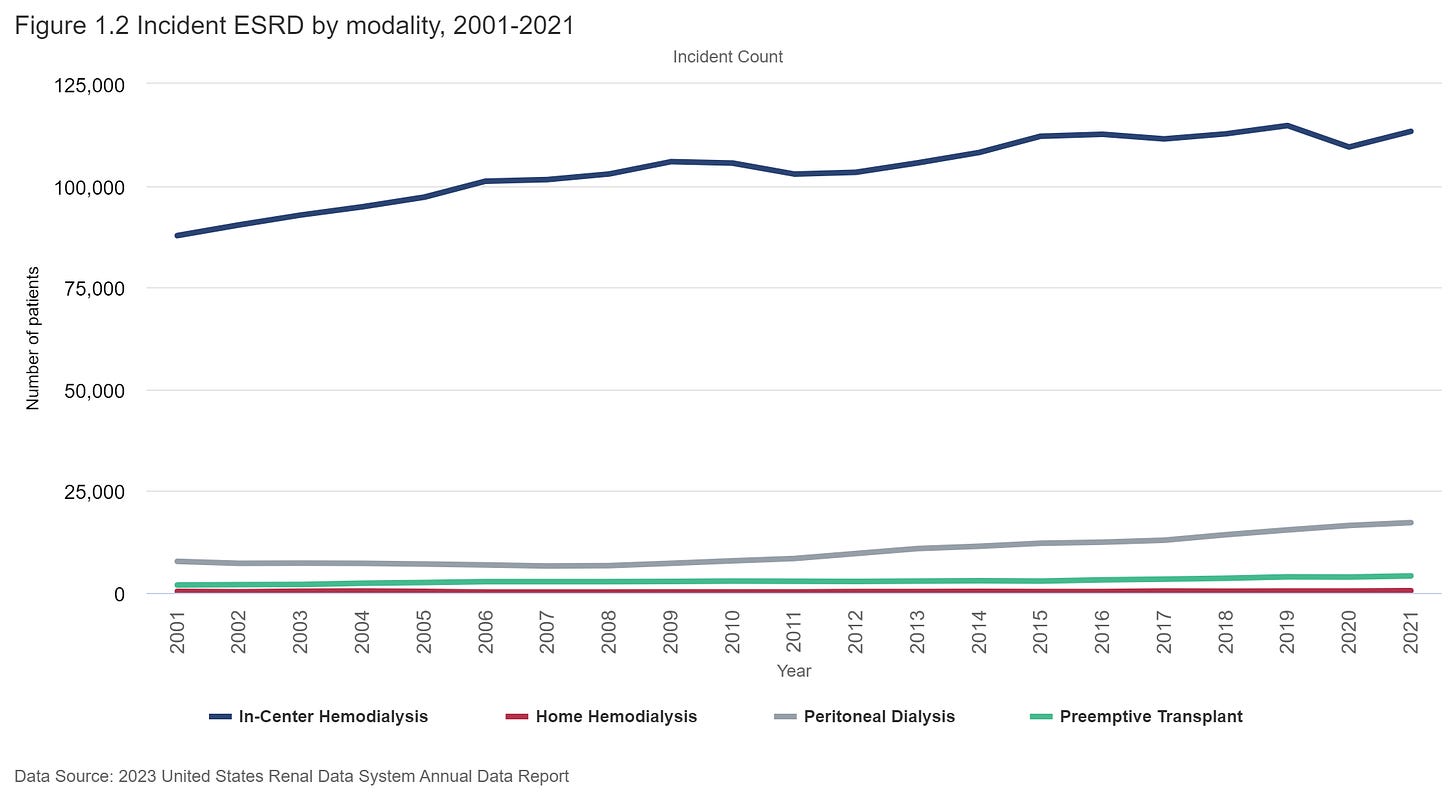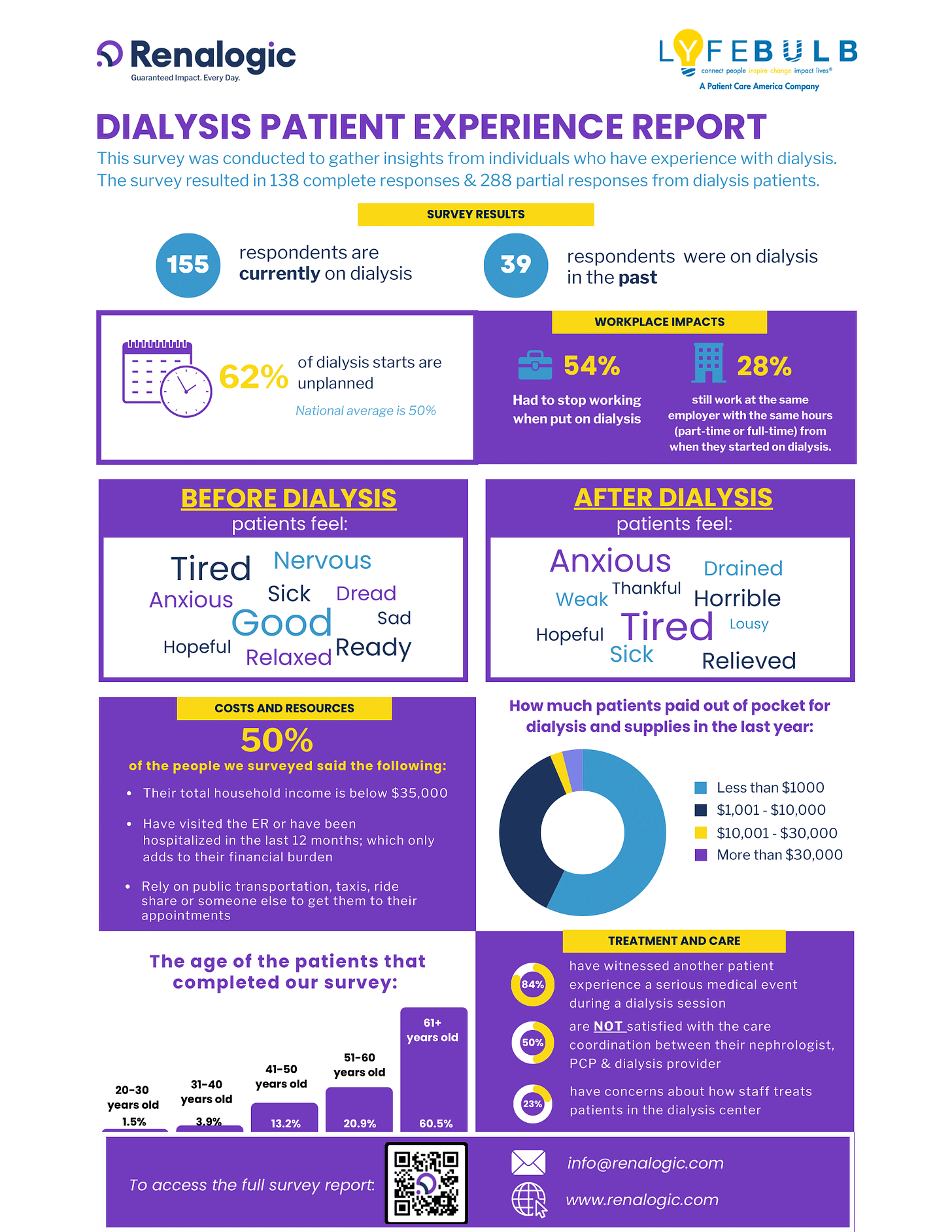First Look: What 150+ Patients Say About the Dialysis Experience
A new survey sheds light on the realities of patient access, safety, and the financial and emotional impacts of dialysis.
This Signals Exclusive is a first look at a soon-to-be-released survey of dialysis patients. My thanks to the teams at Renalogic and Lyfebulb for your commitment, collaboration, and support for this important effort.
What Happened: Earlier this year, a survey was conducted to gather insights from individuals who have experience with dialysis. Nearly 300 people responded. The findings provide invaluable insight into the challenges faced by those receiving dialysis treatment — and its impacts across every aspect of a patient’s life.
Why It Matters: Outside of the standard twice yearly ICH-CAHPS survey, few attempts have been made to understand the broader dialysis patient experience. As a result, we operate in silent silos— one treatment at a time, three million times a year. This survey represents one of the largest such attempts to capture the voices of dialysis patients. Their feedback highlights critical areas needing attention, from unplanned dialysis starts to dissatisfaction with care coordination. With over 135,000 new ESRD cases reported in 2021, these insights are crucial for driving change. The survey's findings underscore the importance of earlier detection and management, and the need for integrated polychronic and behavioral care models.12
Unplanned Dialysis Starts: 62% of participants said their dialysis starts were unplanned, compared to a national average around 50%. 155 respondents are currently on dialysis.3
Patient Dissatisfaction: 50% of patients said they were not satisfied with care coordination between their nephrologist, primary care physician, and dialysis provider.

Bigger Picture: Dialysis is taxing across the board. Patients face constant safety, financial, and emotional challenges from day one. More than 8 in 10 patients surveyed have witnessed serious medical events during dialysis, and half have visited the ER or been hospitalized in the past year. The range of economic and emotional hardship is staggering. For a life-sustaining treatment, what steps must we take to ensure that the resulting quality of life is on par with the engineering marvel that is renal replacement therapy itself?4
Safety Concerns: 84% of patients have witnessed another patient experience serious medical events during a dialysis session. Nearly one quarter of patients expressed concerns about how staff treats patients in the dialysis center. Half of patients visited the ER or were hospitalized in the last twelve months.
Financial Burden: Many patients faced significant out-of-pocket costs for their treatment— upwards of $10,000 (in some cases $30,000) in the last year. At the same time, half of patients said their total household income is below $35,000.
Emotional Impact: Patients experience a range of emotions before and after dialysis. Before dialysis, patients felt good, tired, ready, nervous, and dreadful. After dialysis, patients felt tired, anxious, drained, relieved, horrible, sick and weak. Two words stood out across both sides of treatment: sick yet hopeful.
What to watch: Stay tuned for the release of the full report later this week. In the meantime, download and share the survey infographic below.
Discussion
This survey is an important reminder of why we are all here. For me at least, it’s a call to action as much as it is a call to reflect on our collective mission to improve peoples’ lives. Well, the people have spoken. We know what needs to done. How will we get there— and who will lead the way?
Thank you for being here. If these insights sparked something in you, I’d love to hear from you in the comments below.
Keep exploring,
— Tim
Want to support my work?
ESRD: Incidence, Prevalence, Patient Characteristics, and Treatment — USRDS ADR (2023)

![Signals From [Space]](https://substackcdn.com/image/fetch/e_trim:10:white/e_trim:10:transparent/h_72,c_limit,f_auto,q_auto:good,fl_progressive:steep/https%3A%2F%2Fsubstack-post-media.s3.amazonaws.com%2Fpublic%2Fimages%2F2efc1ef1-ba0b-4ca3-b9f6-a9a790da4b38_1344x256.png)

![Signals From [Space]](https://substackcdn.com/image/fetch/w_36,h_36,c_fill,f_auto,q_auto:good,fl_progressive:steep,g_auto/https%3A%2F%2Fsubstack-post-media.s3.amazonaws.com%2Fpublic%2Fimages%2Fa4736f49-6a20-4fd6-a3de-d48cb4b105f2_375x375.png)



I hate to say that this is not eye opening to me. Honestly it makes me sad that we are failing our patients. We must do better with everything: care coordination, making the patients feel safe, etc. It is what we owe them at the least. The patient perspective is so important...they are going through the disease and treatment. I can empathize with them but I do not know what it is to be on dialysis myself. We need to listen to our patients to improve on what they need...not just from a medical standpoint
Sadly, this comes as no surprise to me having spent 20 years in the clinic as a social worker. ICHD is unfortunately just a dreadful necessity.